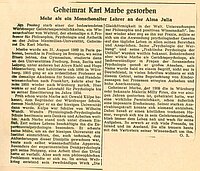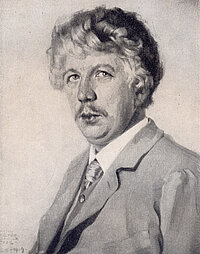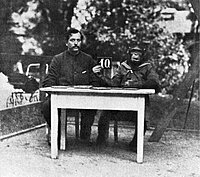Karl Marbe
* 31.08.1869 in Paris † 02.01.1953 in Würzburg
1887 Study of German language, Philosophy and Psychology in Freiburg, later Bonn, Berlin and Paris
1893 Conferral of a doctorate in Bonn (Promotion)
1896 Postdoctoral lecture qualification (Habilitation)
1896 Co-Founding of the Institute of Psychology at the University of Würzburg
1905 Professorship at the "Akademie für Sozial- und Handelsrecht" (Academy for social and economic law) in Frankfurt a. M.
1909 Director of the Institute of Psychology at the University of Würzburg
1927 President of the "Deutsche Gesellschaft für Psychologie" (German Psychological Association)
1935 Retirement from academic duties
Karl Marbe, who had already worked with Oswald Külpe in Leipzig in 1893, transferred to Würzburg in 1894 to work as a Private-Lecturer due to this connection and moreover to found the local Institute of Psychology together with Külpe two years later. In its early years, the Institute already had noticeable success and with the significant involvement of Karl Marbe, was able to create the foundation of the so-called Würzburg School of Cognitive Psychology.
From diagnostics of eligibility to calculating chimpanzees
Karl Marbe had a rich and diverse field of interest during his academic career. He did not only engage himself with the theoretical aspects of his profession by developing concepts like the “Theory der Gleichförmigkeit” (Theory of Uniformity) which explains phenomena of crowd psychology, but did also work on practical issues of psychology. For example, he created diagnostical methods to measure the eligibility of prospective Dentists, Orthopedics and Surgeons. He also did early researches on consumption and advertisement, as well as investigations on the calculation skills of a chimpanzee at the zoological garden in Frankfurt. Moreover, he was one of the first forensic psychologists to work as an expert in the justice system.
The Würzburg School
In addition to his researches, Marbe is also credited to be one of the founders of the Würzburg School, a field of psychology that deals with the basic concepts of the cognitive psychology and has its beginnings in experiments by Marbe and two of his postgraduate students. Despite the criticism of Wilhelm Wundt, who claimed that it is impossible to examine superior cognitive processes, the Würzburg School gained a lot of attention in the second half of the 20th century, as its ideas can be regarded as the foundation of the cognitive turn.
Sceptic of the Third Reich
Despite being retired in 1935, Marbe stayed in Würzburg and critically observed the political events of the Third Reich. During this time, he analyzed the psychological aspects of the population under the influence of deception, propaganda and suggestion through dictatorships, like the Nazi regime and secretly wrote down his findings as a book, called “Zeitgemäße populäre Betrachtungen für die kultivierte Welt” (Contemporary popular contemplation for the cultivated world). Unfortunately, it was not possible for Marbe to publish his researches during his lifetime, as he could not find a publisher who was willing to print such a politically controversial book in post-war Germany. It wasn’t until 2013, that the manuscript was found again in Würzburg and published by the Adolf-Würth-Centre for the History of Psychology.

Recommended Readings:
Marbe, Karl: Zeitgemäße populäre Betrachtungen für die kultivierte Welt. Aus dem Nachlass eines deutschen Gelehrten. Herausgegeben und eingeleitet von Armin Stock, Frankfurt 2016.
Mülberger, Annette: Das Psychologische Institut unter der Leitung von Karl Marbe, in: Janke, Wilhelm (Hrsg.): Hundert Jahre Institut für Psychologie und Würzburger Schule der Denkpsychologie. Hogrefe, Göttingen 1999, S. 127–139.
This article was drafted with the friendly support of Dr. Armin Stock.




